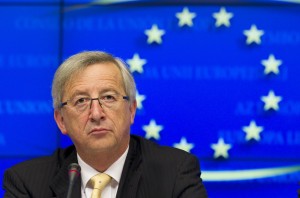“Let’s focus in the next five years on getting Europe’s digital single market to work for Europe’s millions of internet users and innovative SMEs.”
With an impressive political career, having served as Prime Minister of Luxemburg, President of the Eurogroup, and one of the architects of the Maastricht Treaty, Jean-Claude Juncker is the “heavy artillery” of the European People’s Party in terms of experience on European affairs. In an exclusive interview in Proto Thema, Jean-Claude Juncker presents his vision on the European economy, the status of unemployment, his policies, the Cypriot conflict and the burning subject of illegal immigration.
1. Mr Juncker, what is your vision for Europe in the next 5 years?
Jean-Claude Juncker, EPP Candidate for President of the European Commission: I stand for a reunited Europe. I want to reconcile Europe with its people and reunite a Europe divided after the crisis. For me, it has more than just symbolic value that I was nominated as EPP Candidate for President of the European Commission both by the German Christian Democrats and by the GreekNeaDemokratia party. I want to work for a Europe with which Greeks, Germans and all other EU citizens can identify.
I stand for a stronger Europe. Europe urgently needs more growth and more jobs. And it needs more solidarity too. An entire generation is without a job, without a future, without hope. This must be tackled as a priority. As Commission President, I will work night and day to tackle unemployment to put people back to work.
And I stand for a simpler, less bureaucratic and more efficient Europe. I am proud of the Europe we live in today even though it is far from perfect. In the future Europe needs to be big on the big things – like economic and monetary policy, climate change, international trade and migration and not get lost in the small things. Let’s focus in the next five years on getting Europe’s digital single market to work for Europe’s millions of internet users and innovative SMEs.
2. Further to your comment in the debate, how can banks serve the real economy of Europe? What is their role in reducing unemployment?
Jean-Claude Juncker, EPP Candidate for President of the European Commission: Europe needs a well-functioning banking system to support investment. It was the European People’s Party who put in place the architecture to regulate the financial sector better; return public finances to health; and improve the governance of the euro area. We can now prevent, supervise and deal with crises together. We have made sure that never again will taxpayers have to foot the bill for banks’ mistakes. We now need to complete what we have started and ensure that it is put into practice and becomes operational.
Through credits, banks have an important role in allowing companies to thrive and to create jobs. We in the EPP believe that governments do not create jobs and growth, companies do and SMEs in particular.The small entrepreneur, the innovator, the start-ups, they all need a healthy credit system that enables them to develop and grow.
Even more, we need to make sure that credit remains available even after a first or a second failure because it is a known fact that companies are more likely to succeed after the first try, and successful companies mean quality jobs for our citizens.
3. Youth unemployment is one of the biggest tragedies of the crisis, what are your policy plans to combat it?
Jean-Claude Juncker, EPP Candidate for President of the European Commission: Over the next five years, I want to work night and day to get Europe out of this crisis.To make sure Europeans, notably young Europeans, get a decent job.
The European Union needs to invest more in knowledge and in human capital. Young people are the main beneficiaries of these investments and that would boost their opportunities to find a job. But for that we also have to create the job posts. We have to create growth that is not based on debt. We can do so by making stronger use of the best asset we have in Europe: our single market stretching over a whole continent, with 500 million potential consumers. That is why I have made my top priority as Commission President completing the Digital Single Market.
4. You have repeatedly stated the importance of a European Digital Market. How can it benefit the citizen of Europe?
Jean-Claude Juncker, EPP Candidate for President of the European Commission: Less than 10% of Internet users in Europe buy goods and services online and many people who want to do it, just do not have the option. There is a big potential there that needs to be exploited.
To do so we will need to have the courage to break down national silos in telecoms regulation, in copyright and data protection legislation, in the management of radio waves and in competition law. If we do this, we can ensure that European citizens can soon use their mobile phones across Europe without having to pay roaming charges. We can ensure that consumers can access music, movies and sports events on their electronic devices wherever they are in Europe, and regardless of borders.
And we can generate 500 billion Euro of additional growth in Europe in the course of the mandate of the next Commission, thereby creating hundreds of thousands new jobs and a vibrant knowledge-based society.
It is a win-win situation: we create jobs for unemployed people and we enable citizens to enjoy the benefits of the online market.
5. Greece currently is one of the main entrance points of immigration, legal and illegal, in Europe, and treaties such as Dublin II only increase the burden on Greece. Do you have any plans on reforming the way Europe deals with immigration?
Jean-Claude Juncker, EPP Candidate for President of the European Commission: Our common European values and our historic responsibility are my starting point when I think about the future of Europe’s immigration policy. We cannot have common borders if only some have to bear the cost– it is a question of solidarity. And I am convinced that we need more European solidarity in immigration policy.
During my mandate as Commission President, I will build Europe’s immigration policy on five pillars:
Firstly, we need to implement the Common European Asylum System, adopted in June last year, without delay. These will put a stop to ‘asylum tourism’ and make sure an asylum seeker will have the same chances of being granted asylum in any of the Member States.
Secondly, we need to step up the practical assistance provided by the European Asylum Support Office, whose task it is to support Member States under “particular pressure”.
Thirdly, we need to step up cooperation with third countries, particularly North African countries.European partnerships with North African countries to strengthen democracy and pluralism, the rule of law, religious freedoms and support the building up of stable economies are the best investment we can make to cope with the challenge of immigration.
Fourth, Europe needs more political determination when it comes to legal migration.The EU-wide “Blue Card” work permit, introduced by the EU in 2012, is a first step, as it allows highly-skilled non-EU citizens to work and live in any EU country except Denmark, Ireland and the United Kingdom. However, not all Member States have fully implemented the “Blue Card” Directive, and its practical implementation continues to be impeded by red tape at national level.
Last but not least, we need to secure Europe’s borders. Our common Asylum and Legal Migration policies will only work if we can also prevent an uncontrolled influx of illegal migrants. We therefore need step up the operational capacities of the European border agency FRONTEX.
6. Can you talk to us of your initiative for a solution to the conflict in Cyprus?
Jean-Claude Juncker, EPP Candidate for President of the European Commission: Any solution to the Cyprus solution cannot be my solution. It must be the solution of both the Greek Cypriots and the Turkish Cypriots. I am very happy that the discussions for a solution to the Cyprus issue have restarted and I am fully supportive of the efforts that the Cypriot government and President Anastasiades are undertaking.
In this process, the EU has an important role to plan in actively assisting the UN and the two sides in their quest for a timely, viable and lasting solution and in familiarising the Turkish Cypriot community with EU law.
There is hope on the horizon. I am encouraged by the signals of the political leadership as well as by the business communities. Last month, the business leaders and job creators of the two communities came together to support the political efforts and prepare Cyprus for life after reunification. They want to cash in on “the peace dividend” or the economic benefits of a solution for Cyprus. With a peaceful settlement the island’s GDP would increase by over €2bn on average in the first five years and at about €5bn in the first ten years. This would mean that peace would bring an additional annual income for Cypriots of about €1,700 in the first five years and of €3,800 in the first 10 years. Think about the spill-over effects for the economy of this additional income brought by a peace settlement.
Ask me anything
Explore related questions





